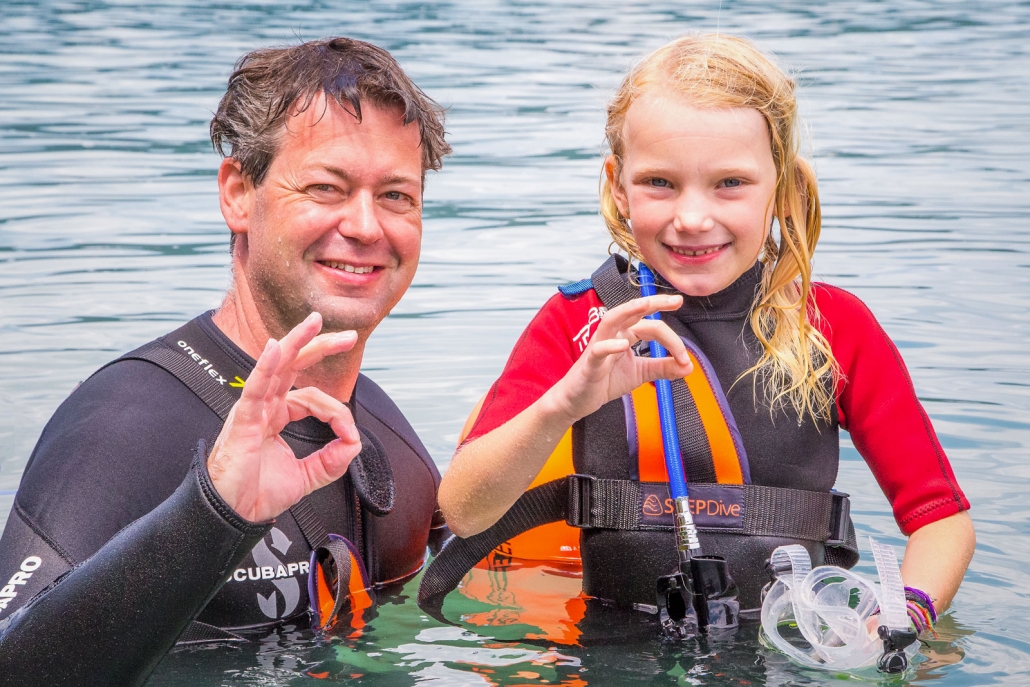Children and Diving: Are they ready?
Often I hear from enthusiastic parents who want their children to learn to dive, but have some concerns regarding the difficulty of the training or their child’s safety in open water. Because of this, I’ve put together the following overview of the considerations that you will need to make as a parent, before taking your children underwater!
Whilst there is no actual legal restriction that prohibits children from diving, agencies such as PADI or SSI have self-regulated training standards, developed through paediatric medical recommendations from research institutions worldwide. These are designed to ensure children reach a level of maturity, before venturing too deep underwater and are as follows:
| Age | Depth | Program | After Certification |
|---|---|---|---|
| < 7 | 0m | Discover Snorkeling | N/A |
| 8 – 9 | Maximum of 4m / 12ft | Bubblemaker / Seal Team | N/A |
| 10 – 11 | Maximum of 12m / 40ft | Junior Open Water Diver (JOWD) | Must dive with a Parent/Guardian or PADI Professional |
| 12 – 14 | Maximum of 18m / 60ft (JOWD) Maximum of 21m / 70ft (JAOWD) | Junior Open Water Diver (JOWD) Junior Advanced Open Water Diver (JAOWD) | Must dive with a certified adult diver |
| 15+ | As per training level | N/A | N/A |
Disclaimer: Standards are subject to change. Please consult the PADI website for further information. STEPDive is not a representative of PADI.
| Age | Depth | Program | After Certification |
|---|---|---|---|
| < 7 | 0m | Snorkeling | N/A |
| 8 – 9 | Maximum of 5m / 15ft | Scuba Rangers | N/A |
| 10 – 11 | Maximum of 12m / 40ft | Open Water Diver (OWD) Advanced SCUBA Training | Must dive with a Dive Professional or certified adult diver |
| 12 – 14 | Maximum of 18m / 60ft (OWD) Maximum of 21m / 70ft (Adventure Deep Dive) | Open Water Diver (OWD) Advanced SCUBA Training | Must dive with a certified adult diver |
| 15+ | As per training level | N/A | N/A |
Disclaimer: Standards are subject to change. Please consult the SSI website for further information. STEPDive is not a representative of SSI.
However, these training standards are written without real explanation as to why these depth and age limits have been chosen. So after some detailed research, I came across the following list of key consideration factors taken from a paper titled Scuba diving in children: Physiology, risks and recommendations, published by the Spanish Society of Paediatric Pulmonology:
Physiological and anatomical factors to be considered in children engaging in underwater activities
- Pulmonary development until the age of eight (underscored by childhood asthma).
- Higher pulmonary closing volume (volume of lung inflated when small airways in the dependent parts of the lung begin to collapse during expiration).
- Reduced pulmonary compliance (higher risk of barotrauma).
- Higher number of respiratory infections and ORL.
- Functional immaturity of the Eustachian tube opening mechanism (canal connecting the middle ear, controlling pressure).
- Unfavourable body surface : weight ratio (risk of hypothermia).
- Incomplete bone development.
- Limited ability to understand mathematical and physical laws.
- Emotional instability.
- Limited ability for self-care and the care of others.
Applying these considerations, agencies thus use age as a generalised measure of physical strength, emotional and intellectual maturity. But applying depth restrictions to children based on their age does not guarantee safety either. Some of the most devastating diving accidents can occur in water less than 5m deep, largely due to panic. This reason alone is why I am such a strong advocate for STEPDive as it:
- Builds proficiency, before depth – even children younger than 8 can learn how to ‘snorkel’ with a SCUBA regulator as we can effectively ‘lock’ their depth at 0m.
- Allows age appropriate or even smaller limits to be set (dictated by student confidence and ability) up to a maximum of 5m.
- Provides a strong foundation in safety knowledge, behaviours and techniques.
- Is safe and simple to use.
- Gives families or groups the chance to experience the underwater world together in a fun and rewarding way.
And once children have reached the appropriate age and maturity level, we fully encourage them becoming Junior Open Water Divers! If you’d like to read more about this topic, the Divers Alert Network (DAN) has published a terrific article about Children and Diving, which includes detailed opinions from industry experts.
See you underwater!
:: Darren




